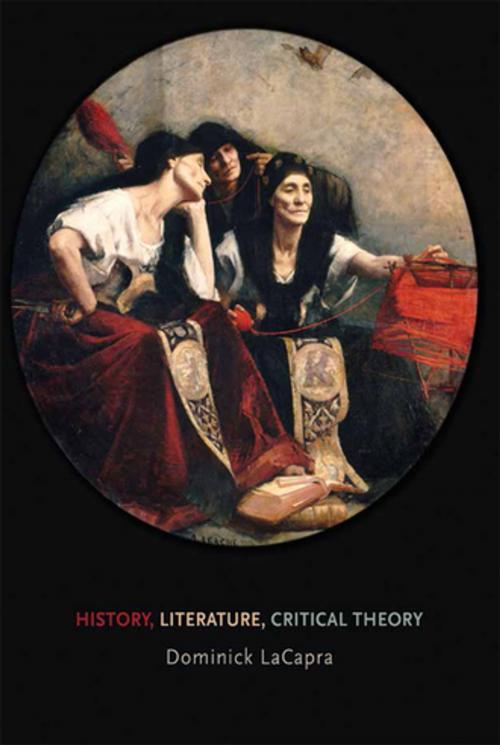| Author: | Dominick LaCapra | ISBN: | 9780801467769 |
| Publisher: | Cornell University Press | Publication: | December 15, 2009 |
| Imprint: | Cornell University Press | Language: | English |
| Author: | Dominick LaCapra |
| ISBN: | 9780801467769 |
| Publisher: | Cornell University Press |
| Publication: | December 15, 2009 |
| Imprint: | Cornell University Press |
| Language: | English |
In History, Literature, Critical Theory, Dominick LaCapra continues his exploration of the complex relations between history and literature, here considering history as both process and representation. A trio of chapters at the center of the volume concern the ways in which history and literature (particularly the novel) impact and question each other. In one of the chapters LaCapra revisits Gustave Flaubert, pairing him with Joseph Conrad. Other chapters pair J. M. Coetzee and W. G. Sebald, Jonathan Littell’s novel The Kindly Ones and Saul Friedländer’s two-volume, prizewinning history Nazi Germany and the Jews.
A recurrent motif of the book is the role of the sacred, its problematic status in sacrifice, its virulent manifestation in social and political violence (notably the Nazi genocide), its role or transformations in literature and art, and its multivalent expressions in "postsecular" hopes, anxieties, and quests. LaCapra concludes the volume with an essay on the place of violence in the thought of Slavoj Žižek. In LaCapra’s view Žižek’s provocative thought "at times has uncanny echoes of earlier reflections on, or apologies for, political and seemingly regenerative, even sacralized violence."
In History, Literature, Critical Theory, Dominick LaCapra continues his exploration of the complex relations between history and literature, here considering history as both process and representation. A trio of chapters at the center of the volume concern the ways in which history and literature (particularly the novel) impact and question each other. In one of the chapters LaCapra revisits Gustave Flaubert, pairing him with Joseph Conrad. Other chapters pair J. M. Coetzee and W. G. Sebald, Jonathan Littell’s novel The Kindly Ones and Saul Friedländer’s two-volume, prizewinning history Nazi Germany and the Jews.
A recurrent motif of the book is the role of the sacred, its problematic status in sacrifice, its virulent manifestation in social and political violence (notably the Nazi genocide), its role or transformations in literature and art, and its multivalent expressions in "postsecular" hopes, anxieties, and quests. LaCapra concludes the volume with an essay on the place of violence in the thought of Slavoj Žižek. In LaCapra’s view Žižek’s provocative thought "at times has uncanny echoes of earlier reflections on, or apologies for, political and seemingly regenerative, even sacralized violence."















